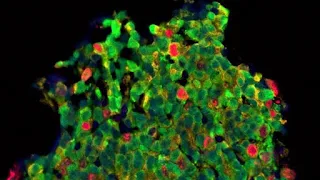«A new class of drug that attacks cancer indirectly - by
destabilizing proteins that cancer cells need to survive and multiply -
shows promise in fighting prostate cancers that have become resistant to
treatment and have started spreading to other parts of the body.
Research in mice shows that the new drugs - called Hsp90 inhibitors -
target and disable a mechanism that helps prostate cancer cells evade
the effect of standard treatment. The study - led by The Institute of
Cancer Research (ICR), London, United Kingdom, and published in the
journal Cancer Research - reveals important insights into the role of
Hsp90 and similar proteins in drug-resistant prostate cancers,
suggesting new cancer treatments may arise from discovering ways to
block them. The findings suggest the new drugs may benefit men with
prostate cancer who have run out of treatment options.
Prof. Paul Workman, chief executive of the ICR and co-leader of the
study, says they call the new drugs "network drugs" because they target a
network of signals that cancer cells hijack, rather than just one
pathway. He adds: "These drugs can hit cancer harder than those
targeting only one protein and look promising for preventing or
overcoming drug resistance." Prostate cancer cells need male hormones
called androgens to feed their growth and spread. Blocking androgen
receptors can be an effective treatment that cuts off their supply.
In their new study, the team found Hsp90 inhibitors also appear to
block production of abnormal versions of the androgen receptor, which is
how cancer cells evade standard treatments that target the normal
version. They produce abnormal versions of the receptor that do not
require the hormone to be active. In tests on mice injected with
lab-grown human cancer cells, the team showed that Hsp90 inhibition was
effective against AR-V7 - the most common androgen receptor variant.
The researchers found the drug worked in a new and unexpected way to
reduce AR-V7 production. It interfered with messenger RNA - the
molecules that carry the genetic code for producing the protein from DNA
to the protein-making machinery in cells. They also found that Hsp90
inhibitors reduced levels of normal androgen receptors and two other
molecules necessary for prostate cancer growth: AKT and GR. Hsp90
inhibitors are already being tested for human use in clinical trials for
several types of cancer.
Prof. Paul Workman concludes "It's an
exciting discovery which adds a string to the bow of these cancer drugs,
and means they could work against prostate cancers that have otherwise
stopped responding to treatment."»
Fonte: http://www.medicalnewstoday.com/articles/309802.php
Comentário do Bloguista: O cancro da próstata é uma patologia associada a um crescimento anormal das células que constituem este órgão, sendo um dos cancros mais fatais em homens a nível mundial. Os seus fatores de risco incluem fatores ambientais, como a alimentação e estilo de vida, genéticos (mutações raras com elevada penetrância ou uma combinação rara de várias mutações comuns), a idade e a etnia. O seu diagnóstico deve ser efetuado o mais precocemente possível, para que se possa iniciar o tratamento rapidamente de modo a minimizar os efeitos negativos do mesmo.
Ao nível do tratamento, este está dependente da possível existência de metástases. No caso de não existirem, as alternativas para o tratamento local são a braquiterapia, a prostatectomia, a privação de androgénios e o uso de uma panóplia de terapias focais como a ablação por radiofrequência e ultrassons. Para o tratamento de metástases, os tratamentos utilizados são a quimioterapia, terapia hormonal e terapias que têm como alvo o osso, mais especificamente para as metástases ósseas.
Este estudo inovador atua num novo alvo terapêutico, atuando nesta patologia de uma forma indireta através de inibidores da Hsp90. Apresenta resultados com potencial e poderá constituir uma descoberta importante, trazendo consigo uma nova esperança para os casos resistentes às terapias convencionais.
Fonte: http://www.medicalnewstoday.com/articles/309802.php
Comentário do Bloguista: O cancro da próstata é uma patologia associada a um crescimento anormal das células que constituem este órgão, sendo um dos cancros mais fatais em homens a nível mundial. Os seus fatores de risco incluem fatores ambientais, como a alimentação e estilo de vida, genéticos (mutações raras com elevada penetrância ou uma combinação rara de várias mutações comuns), a idade e a etnia. O seu diagnóstico deve ser efetuado o mais precocemente possível, para que se possa iniciar o tratamento rapidamente de modo a minimizar os efeitos negativos do mesmo.
Ao nível do tratamento, este está dependente da possível existência de metástases. No caso de não existirem, as alternativas para o tratamento local são a braquiterapia, a prostatectomia, a privação de androgénios e o uso de uma panóplia de terapias focais como a ablação por radiofrequência e ultrassons. Para o tratamento de metástases, os tratamentos utilizados são a quimioterapia, terapia hormonal e terapias que têm como alvo o osso, mais especificamente para as metástases ósseas.
Este estudo inovador atua num novo alvo terapêutico, atuando nesta patologia de uma forma indireta através de inibidores da Hsp90. Apresenta resultados com potencial e poderá constituir uma descoberta importante, trazendo consigo uma nova esperança para os casos resistentes às terapias convencionais.


Comentários
Enviar um comentário